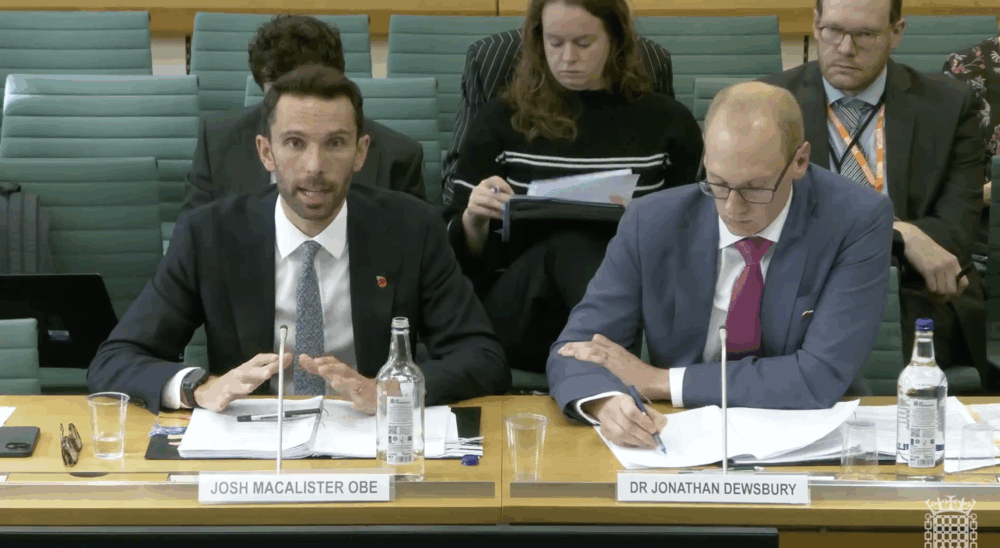A “significant minority” of schools are not managing their estates properly, MPs have been told, as Labour prepares to publish its “long-term” education estates strategy.
Children’s minister Josh MacAlister and senior Department for Education official Dr Jonathan Dewsbury took questions from education select committee members this morning.
They were quizzed on school rebuilding programme (SRP) delays, the government’s RAAC bill and its “older building” research.
Here’s what we learned…
1. Estates strategy published ‘very soon’
MacAlister revealed government will publish “very soon” a “long-term estates strategy” setting out “over a number of years” its plan “to get on top of” maintenance backlog issues.
He is “very open” to hear from leaders “on the future” of the condition improvement fund (CIF), having heard from leaders “that the lack of long-term sight around that allocation makes it difficult to prioritise projects”.
Single-academy trusts and small MATs have to apply for estates cash through CIF, while larger chains and councils receive money automatically. Schools Week revealed last year that ministers were reviewing the system for allocating maintenance funding.
The estates strategy “will set out even more confidence” around future funding, MacAlister said. But it is not yet clear whether that will be through a “multi-year settlement” or “indication[s]” over future allocations.
2. ‘Older building’ research
The DfE’s annual report for 2024-25, published earlier this year, listed the risk of building failure in the education estate as “critical – very likely”.
But this morning, Dewsbury stressed government was “not aware of any pupils learning in environments that are unsafe”.
He said one reason for the rating was because Labour’s “unprecedented” investment in capital funding – “up to £3 billion by 2034” with £20 billion for the SRP – “will take time to bed in”.
Another is officials are awaiting the outcome of research into “older buildings”, which is due to conclude in the spring. This will help the department “further assess that risk”.
Early findings show there are “no systematic issues” from system builds, a type of post-war structure previously identified by DfE as a “key risk”.
There are more than 13,000 these blocks, with officials most concerned about 3,600 that used concrete or timber frames
But the research shows the deterioration of the estate “due to a lack of maintenance”, Dewsbury said.
3. ‘Significant minority’ not meeting standards
Committee member and Labour MP Darren Paffey noted there are “no mechanisms for monitoring schools’ compliance” with the government’s estate management standards, published earlier this year.
Dewsbury said the DfE was working with responsible bodies and the Confederation of School Trusts to create a “better assessment of where the compliance is or not”.
“The majority of the sector are meeting those standards already,” he added.
“There’s a significant minority we think that aren’t meeting those standards, particularly highlighted through RAAC.”
The government has gathered data on this during its latest round of condition data collection school surveys. Dewsbury said this was done by asking leaders if they “have an asset management plan in place”.
The department will share the data with those “that need to make the right decisions in due course”.
4. ‘No intention to rebuild all schools’
In a letter to government two years ago, Institute of School Business Leadership CEO Stephen Morales warned capital investment levels meant it would take 400 years to replace every primary and secondary in the country.
However, Dewsbury told the committee today DfE “has no intention to rebuild all schools”. Instead, it is working to “practically maintain” schools. Only when there’s “acute condition need” will they be rebuilt.
“Planning permission is a big barrier to school rebuilding programmes,” he continued.
“It’s interesting when you’re rebuilding a school on the same site, on the same location, why that has to go through full planning permission rather than being permitted development.”
MacAlister said Labour’s “wider approach to changing the planning system is exactly to speed up these kinds of projects”.
5. ‘Lessons learned’ from building failures
When asked what the process is for selecting approved SRP contractors, MacAlister said the DfE had “learned lessons from other construction projects that have failed”.
It is “trying to move away from … procuring a bespoke arrangement for a school”, with the programme “designed to partner with a smaller number of organisations that have got a good track record”.
“We don’t want to take too many risks with the SRP pounds through very novel approaches,” MacAlister added.
6. £211m spent on RAAC
Dewsbury confirmed £211 million of government cash has been spent on RAAC “mitigation and remediation” so far.
He wouldn’t provide forecasts for future spend “because they’re subject to commercial negotiations with individual commercial suppliers and contractors”.
















Your thoughts